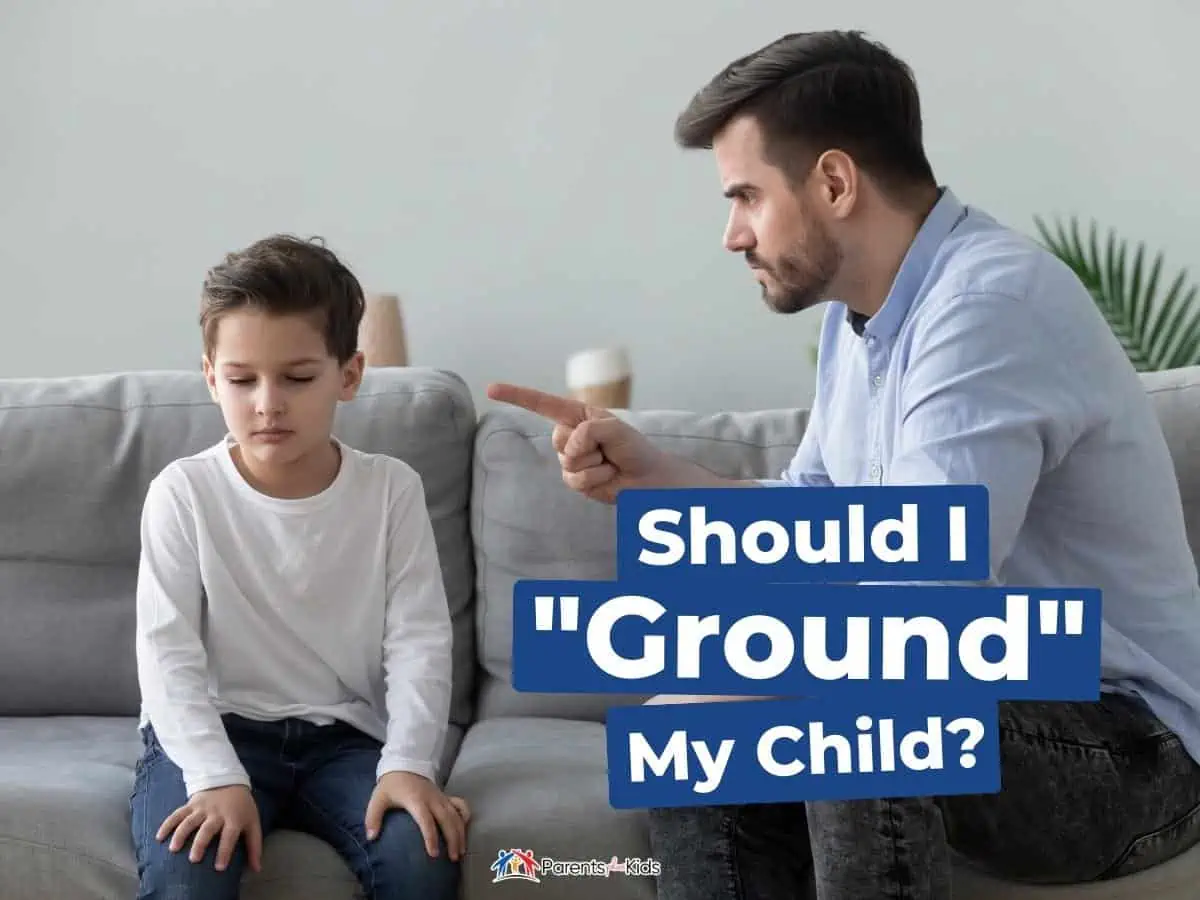Should I “Ground” My Child?

This post may contain affiliate links. If you buy through the link, I may earn a commission. Learn More.
Grounding a child is one of the most basic forms of punishment. You can think of it as an extended time-out.
Grounding is both effective and harmless as long as you do it right.
Like all punishments, grounding should not be overused or used as an extreme measure.
Should I Ground My Child?
Yes, for the right situation. There are times when grounding is the right choice, and there are times when it isn’t. Only ground your child when they will benefit from the downtime.
Grounding allows children time to think about their poor actions and how they can be resolved. Do not ground excessively or without reason.
What is Grounding?

Grounding, in its typical form, means not allowing children to take part in activities they enjoy.
Most parents think of grounding as not allowing kids out of the house. There are other forms of grounding that can be just as helpful, if not more so.
Grounding from electronics is a popular choice. That might involve the removal of phones, tablets or video games.
How Long Should I Ground My Kid?
The length of a grounding should be on a case-by-case basis. A child’s first grounding might only last a few hours. As they get older, they may need more time to think about their actions.
A parent needs to use their best judgment on this. You can tell your child that they are grounded for a specific amount of time or until a resolution is reached.
For example, your child might be grounded until they have completed their homework or until they have realized they need to apologize for some infraction.
How Old Should a Child Be When Grounding Starts?
The age a child can be grounded depends on how mature your child is. Most experts agree that grounding can start as young as age six.
A child younger than six might not understand what it means to be grounded, which doesn’t give them the chance to improve.
A time-out is an appropriate punishment for a young child. I used one minute per age for my children. Therefore, a three-year-old received a three-minute time-out, and a five-year-old received a five-minute time-out.
Those few minutes of modified “grounding” can feel like a lifetime to a busy child.
I used one minute per age for my children. Therefore, a three-year-old received a three-minute time-out, and a five-year-old received a five-minute time-out.
Another approach for younger timeouts is a different type of grounding. Sometimes, I grounded my kids’ toys. When my son hit another child with his plastic dinosaur, the dinosaur was grounded for two full days.
As that was my son’s favorite toy in the world, it was devastating to him that his toy was “in trouble.” I placed the dinosaur in an area was my son could see it but not touch it. We lovingly called it the “toy timeout spot.”
Can a Child Be Too Old For Grounding?
There is also an age when a child becomes too old for grounding. Around age 15, grounding loses its effectiveness.
This is because older teenagers already know when they have done something wrong. They are aware of cause and effect. They rarely need an extended amount of time to think about their actions.
Likewise, grounding isn’t always a punishment for a 15-year-old. I know when I was that age, being sent to my room felt like a reward.
I had a television, a VCR, my own phoneline and a CD player (it was the 90s when not all of that was on one, handheld device). My room was a paradise.
When is Grounding Appropriate?
Grounding is effective for many infractions.
You might ground your child because:
- they haven’t turned in their homework.
- because they are fighting with other children.
- because they are behaving in a disrespectful manner.
- because they refuse to do their household chores.
It’s not as important why a child is grounded as how. The punishment needs to match the rule breach.
If a child only breaks a small rule, like forgetting to put a coaster under a glass of water, a harsh grounding doesn’t make sense.
Long-term grounding is rarely effective. Over an extended length of time, a child only grows to resent their parents. There are case studies to prove this, including my own.
Long-term grounding is rarely effective.
My parents were infamous for not putting any real thought behind rules or punishment.
They flailed between “you are not allowed to leave this house for six weeks because I said so” and “we don’t care where you go or when you get back as long as you don’t wake us up when you come home.”
A memorable punishment of mine was a three-month grounding for being 30 minutes late for my 8 PM curfew. By the time the grounding was complete, I was a pro at sneaking out.
On the opposite end of the spectrum, a grounding that is too minimal is unlikely to make a dent. You need to ground your child for long enough that they are impacted by the punishment but not so long that it is unjustified.
Unfortunately, there is no pamphlet that explains the perfect punishment for each infraction. That is something you will need to figure out on your own.
What Are the Pros and Cons of Grounding?

Grounding is a time-honored punishment that has been utilized by parents for generations. However, there are both pros and cons to grounding.
Pro: Grounding is Easy to Enforce
This is especially true when children are young.
When you are the one who takes them to activities, all grounding requires is you not taking them to the playdate or party they had hoped to attend.
If children are grounded from electronics, all you have to do is take them away. As punishments go, grounding is a pretty easy one.
Con: Enforcement Requires Parental Vigilance
Are you disciplining for the sake of disciplining, or do you want your children to learn? If it’s the latter, you need to stay strong until the grounding meets its end.
If your child is grounded until she cleans her room, don’t let up until the room is clean. If your child is so much more pleasant when he has video games to occupy him, don’t relent and give him back his Xbox.
The truth is, sometimes the grounding is a punishment for you as well.
Pro: Children Can be Productive While Grounded
Grounded kids may be tasked with doing chores or homework while they are not doing the things they prefer.
My daughter was recently grounded because her room was dirty.
That’s not exactly accurate. Her room wasn’t dirty. Her room looked like someone found a rabid squirrel, stuffed it with amphetamines, and gave it a machete.
She was told she was grounded until the room was clean again. It took two weeks, but we can actually see the floor now. Who knew she had brown carpet?
Con: Children Can be Destructive While Grounded
The opposite is certainly true. My son, in his younger years, was grounded for breaking a rule that I have long since forgotten.
What I haven’t forgotten was that he found some markers in his bedroom and decorated the freshly-painted walls.
Lesson: Keep an eye on grounded children until they are old enough to be trusted with markers.
Pro: Most Parents Will Agree With You
Most parents practice some form of grounding. Some figures show that up to 65 percent of parents in the United States practice grounding from electronics.
Odds are, most of your parent-friends will commiserate with you and understand why you chose to ground your child.
Con: Some Parents Will Tell You That You Are Wrong
Parents have opinions. Some of those opinions are very strong. Some believe that grounding doesn’t work.
Many believe that punishment is wrong in any form. You will always have to hear other opinions unless you cut yourself off from all forms of communication.
Pro: Grounding is a Form of Meditation
Children need to take time for mindfulness. Grounding can allow them to calm their minds while they refocus their efforts into more constructive behavior.
Con: Too Much Grounding Might Result in Backlash
As I mentioned earlier, I rebelled from my grounding in a way that could have been very harmful to me. I was not alone.
Children will often fight back when they are punished too harshly, too often or if the punishment doesn’t fit the crime.
If you find that your grounding punishment isn’t working, don’t double down. Instead, find something new.
Other punishments might involve doing more chores, restrict privileges without removing them or simply allow natural consequences to take place.
Key Takeaways
Any kind of punishment shouldn’t be taken lightly.
You are right to wonder if grounding is appropriate. In most cases, grounding is a sufficient way to get kids to stop and think about what they’ve done.
Do you agree or disagree? Tell us in the comments!
